What is a watershed? And why does it matter?
Creation Care
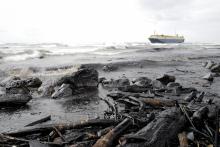
Andrew Bird is one of my favorite musicians. I love the way he makes a one-man band, looping over his own violin playing, singing, whistling, and stomping to create beautiful songs. No two live performances are the same. And once, when I saw him in D.C., he played a new song that was still being written — one that had come from his heart, but he hadn’t yet finished and didn’t think it had an end.
He told us he wrote the song during the BP oil spill, often called “Deepwater Horizon,” that happened in the Gulf of Mexico. During that disaster, over 200 million gallons of crude oil spewed into the Gulf for days on end from a hole nobody could plug, and the whole country watched it happening live.

“Humanity is intimately tied to the world we live in, and every societal action and technological advance has an effect on the earth,” reads one of the plaques in the current Unintended Journeys exhibit at the Natural History Museum in Washington, D.C.
The temporary exhibit, which runs until Aug. 13, is a powerful photographic portrait of the catastrophic effects environmental disasters are having on millions of people around the world.
The exhibit focuses on five different countries that have recently experienced or continue to experience severe weather conditions that have caused displacement, migration, intense hardship, and death for inhabitants. The disasters covered are the Hurricane in the Gulf, the Earthquake in Haiti, the Tsunami in Japan, Flooding in Bangladesh, and Desertification in East Africa.
For me, joy in the everyday begins with food. If I can take time to make food and drink holy, if I make my table a place of family and community, a place of health and wellness, a place of good choices that sustain creation, I am grounded. Food is the place where I began my journey towards social justice, as a self-righteous young vegetarian who lusted after meat.
Food is the thing we all have in common, and with it, Jesus set forth the Eucharist. Is that enough for you to believe food is important?
Do you ever wonder why Paul spends so much time advising his churches on food and dinner manners? It's because the Eucharist was a wine-and-bread-leavened feast that intentionally leveled the strict hierarchy of Roman society. This enables Paul to confidently state, "There is no longer Jew or Greek, there is no longer slave or free, there is no longer male and female; for all of you are one in Christ Jesus."
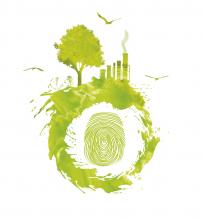
What more perfect a passage to enliven our Earth Day celebrations than Romans 8:20-25?
Paul's letter to the Romans was certainly not an exhortation to deepen creation care by weighting it with environmental justice. It wasn't an exhortation for the middle-class church to listen to the groaning of people under the bondage of environmental racism. It wasn't intended to paint a picture of the intersection of climate change, poverty, and racism.
But we — two evangelical activists — are just foolish enough to give all that a try in this short space!
Our dear Apostle Paul in his letter to the Romans paints a picture of the new age inaugurated by Jesus' death and resurrection. Jesus has taken sin – that which infiltrated the world (5:12), enslaved the world (6:6, 17-18), and brought death and destruction (7:8-14) — and had victory over it. By our death in baptism and resurrection with Christ, we participate in his victory over sin (6:4). This is a new age, we put on our new selves, we live with the (re)new(ed) creation ahead of us.

And as I worshiped I realized creation wasn’t singing with me. I had entered into creation’s ongoing worship of God!
But Scripture speaks of another utterance of nature — a groaning. (Romans 8:19-22) Even as creation worships, it bears the weight of our sin. Our addiction to consumption, our oil drills and oil spills, and our depleted uranium bullets whizzing through theaters of war in countries ravaged, torn apart — both the people and the land. Creation is groaning, even as the trees lift their branches heavenward in worship.
The Genesis 2 story of creation offers a profound picture of humanity’s relationship with the rest of creation in the beginning. In Genesis 2:15 God called humanity to till and keep the Garden of Eden. The Hebrew word for “till” (‘abad) is also translated “to serve” (as a bond servant). The Hebrew word for “keep” (shamar) is most accurately translated “to protect.” Thus, we were called to serve and protect the rest of creation. In the very beginning of our existence, we related to the land as its servants — its protectors. That relationship was full of care, nurture, security, and selfless service.

Last week during my Sunday school class, one of my second graders asked, “How can we go to heaven, if we continue to sin?”
As usual, I am often stunned and quieted by the striking questions that come from the mouths of young people.
I usually respond to the inquisitive questions from my Sunday School students by reiterating what I have been told by many a Sunday School teacher: “Even though we break our promises, God doesn’t; God promised us if we believe in God and that God’s Son Jesus died for our Sins, we will go to heaven — even when we mess up.”
While that seems like a really ‘simple’ explanation of one of many biblical truths, it is still striking and amazing that even though we continue to ‘mess up,’ God has not retracted on God’s promise of offering us a beautiful ending to the troubled world we live in today.
As I think about Romans 8:21 and how it speaks to the fact that “creation itself will be liberated from its bondage to decay and brought into the freedom and glory of the children of God,” I get excited. Not only because we all will see the glory of God one day, but that the bondage and decay we are experiencing in our physical world will end in Glory!

Last fall, on a Sunday afternoon, as I walked out of the church, a young man tugged on my Franciscan habit. It was Miguel, a member of our Latino choir.
“Father,” he said, “please, pray for the people of my home parish back in El Salvador, especially for one of the priests who has received death threats.”
Startled, I asked: “What is happening there?"
“These priests are organizing against the multinational companies,” he said. “The companies are looking for gold. What will be left for our people? Only poisoned water, a wasteland, and death.”
A few weeks later, I had another similar conversation with a group from Guatemala. Theirs was a similar tale of how indigenous communities were being threatened by mining projects.
As a Catholic and a member of the Franciscan Order, I believe that we are called to “read the signs of the times” and to listen to the cry of the poor and the “groaning” of God’s Creation.

When facing a crisis, silence is certainly easiest. But silence isn’t best. As we face some very challenging environmental issues, evangelicals must learn to begin to discuss the environmental crisis with creativity and integrity. Whether it’s because we know we play an integral role in the healing of the world, in agreement with Wendell Berry, who says our fate is “mingled in the fate of the world.” Or, because we’ve come to see our responsibility to care for God’s creation as a central aspect of our love of Jesus Christ. Regardless of our reason — silence can’t be our policy.
In a very real sense, the easiest way for us to deal with the realities of the 21st century ecological crisis is practicing a kind of mutual pretense. That’s the easiest thing to do. Despite the humming knowledge that hard things await, we will talk about anything without actually talking about what is going on. More than many, I know that this can be the practice of evangelical Christianity in which I am rooted. We’ll talk about the return of Jesus, about theology, about church practice, anything but what’s actually going on in our world.

SOON AFTER Dr. Michael Hendryx assumed a professorship of health policy management at West Virginia University, he started hearing stories of sick people in Appalachian communities near mountaintop removal coal mining operations. Finding no scientific research that examined the correlation between mountaintop removal and community health, Hendryx and his colleagues began overseeing family health surveys and compiling health data from the Centers for Disease Control and Prevention.
Since 2011, Peter Illyn of Restoring Eden (Christians for Environmental Stewardship) has recruited and led student volunteers from Catholic and evangelical Christian colleges in conducting door-to-door community health surveys for Hendryx’s research. Typical volunteer experiences, according to Illyn, include “aha” epiphanies and deepening conversions to God’s justice. Alex Gerrish, a recent Samford University (Birmingham, Ala.) graduate, recalls a searing experience. Her survey team visited a home located close by two mountaintop removal (MTR) operations, where a mother answered the door. She said, “I’m trying to get my son down for a nap,” explaining that her two-year-old had a heart defect. “Now’s not a good time to talk.” Two days later the team revisited the home to be met by an older, tear-stained woman. “I’m sorry,” she said. “My grandson passed away a couple days ago.” He never woke up from his nap. As Gerrish stood in shock, she recalled the statistics on high birth-defect rates in communities with mountaintop removal operations.
Now, more than two dozen published peer-reviewed studies show a high correlation between populations living amid MTR operations and very high rates of morbidity, asthma, chronic obstructive pulmonary disease, heart disease, cancer, and birth defects.

I'D ALWAYS HOPED that the president’s “all of the above” energy strategy was a mere campaign slogan, a way to avoid riling anyone up as he ran for re-election. But he’s made pretty clear that it’s actually his guiding light.
“The all-of-the-above energy strategy I announced a few years ago is working,” he crowed in his State of the Union address. And indeed it is, if the goal is to drill, baby, drill. In Obama’s time in office, U.S. oil production has increased 50 percent; analysts estimate that by the time he’s gone in 2016, we’ll have literally doubled the amount of oil we produce in this country. The curve for natural gas production has been almost as steep, and though we’re burning less coal in our own power plants the amount we export has hit record highs.
In political terms, Barack Obama holds us environmentalists at bay with pretty words on climate change, but when it comes time to drill he’s the go-to guy. As he told a crowd of cheering oilmen in Oklahoma during the last campaign, “over the last three years, I’ve directed my administration to open up millions of acres for gas and oil exploration across 23 different states. We’re opening up more than 75 percent of our potential oil resources offshore. We’ve quadrupled the number of operating rigs to a record high. We’ve added enough new oil and gas pipeline to encircle the Earth and then some.”
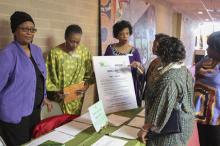
At Trinity United Church of Christ in Chicago, members and neighbors buy fruits and vegetables from a black farmers market and work in an organic garden named after botanist George Washington Carver.
They recycle their church bulletins, plan to renovate their building with a “green” roof and have purchased 27 acres for a community project that will include an urban farm.
“By any greens necessary,” the Rev. Otis Moss III, the church’s pastor, likes to say.
When it comes to African-American churches and a focus on the environment, Moss and his congregation are the exception rather than the rule.
Moss said many of his black clergy colleagues are less interested in conservation and tell him: “That’s your thing.”
Black congregations have tended to focus on their members’ basic needs — getting jobs, rearing children, pursuing higher education.

Deuteronomy 8 says “the Lord your God is bringing you into a good land, a land of flowing streams, with springs and underground waters ... a land where ... you shall bless the Lord your God for the good land he has given you.
When you arrive in Nebraska, signs on the interstate will welcome you to “The Good Life.” The folks who came up with our unofficial state motto may or may not have had the passage from Deuteronomy in mind, but to witness Nebraskans’ love for their land is to understand that it is a quietly sacred connection.
That connection found its voice in Nebraska citizens’ four-year battle to stop the TransCanada pipeline. In face of the threat of oil spills polluting the underground Ogallala Aquifer, of construction spoiling the fragile Sandhills region, and of a foreign corporation using bully tactics to seize landowners’ property, a remarkably diverse coalition of farmers, ranchers, environmentalists, Republicans, Democrats, Independents, grandmothers, students, and citizens took hold to protect Nebraska land.

This week, Secretary of State John Kerry spoke more forcefully about the urgency of climate change than he has before publically, likening it to a weapon of mass destruction. Apparently, such words did not sit well with Sen. John McCain, a politician who was once a pioneer in the political fight against climate change. In response to Kerry, McCain asked, “On what planet does he reside?”
For some context: Kerry has been traveling worldwide. He made his climate change speech in Indonesia, a nation made up of islands that are already experiencing the impacts of climate change. Climate change isalready contributing to changes in rainfall in the country, with serious droughts and flooding, and the threat of significant sea level rise. Furthermore, Indonesians seem more aware of climate change than we are — no surprise given its impact on their entire country. In its Climate Asia project, the BBC found that 63% of Indonesians said the number of trees had decreased and 74% believe that climate change is happening (compared with 68% of Americans). Kerry was speaking about an imminent problem to a nation where most people are aware of that problem.
Don’t let the media tell you that nothing is going to happen in Washington this year. Sure, Congress may be gridlocked on major legislation as we approach midterm elections, but key decisions are set to be made that will define President Barack Obama’s legacy on climate change. In the coming months, the Environmental Protection Agency is finalizing carbon pollution standards for both new and existing power plants, and the Obama administration will make a final decision on the Keystone XL pipeline.
Because the impacts of climate change, such as drought, more severe weather, flooding, and crop devastation, are more harmful to the world’s poor, these decisions will affect the lives of vulnerable people everywhere. As a Christian, I cannot sit idly by while God’s children are suffering from the devastating effects of irresponsible environmental degradation. I am joining with other people of faith in articulating the moral urgency of caring for God’s creation.
If you think it’s impossible to change evangelicals’ views on climate change, think again.

A new film charting Charles Darwin’s passage from Christian to nonbeliever propelled its maker on a similar journey.
“Questioning Darwin,” a new, hourlong documentary airing on HBO throughout February, juxtaposes the story of the 19th-century British naturalist with looks into the lives of contemporary American Christians who believe the world was created in six days, as described in the Book of Genesis.
Antony Thomas, the 73-year-old British filmmaker behind the camera, said while his goal was to highlight the way his subjects answered big questions about the origins of life, a loving God, and the purpose of suffering, he found his own answers to those questions changing.
“This is a personal feeling, but I do believe the two [a belief in God and in evolution] are not compatible,” Thomas said by telephone from New York, where he is working on another documentary. “And that is what made this worthwhile for me.”
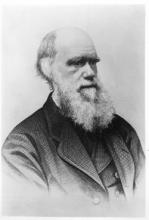
Happy Darwin Day! A time to play pin the tail on the sparrow, partake of “phylum feasts” (potluck dinners where the ingredients come from many different species), and generally give a thumbs-up to evolution’s godfather, Charles Darwin, on his 205th birthday, Wednesday.
A growing number of Americans of varied religious backgrounds are marking the 1809 birthday of the British naturalist whose masterpiece “On The Origin of Species” has never been out of print since its publication in 1859.
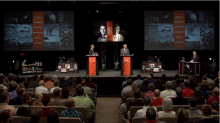
There was a moment during last week’s “debate” between Bill Nye the Science Guy and young-earth creationist Ken Ham that I think was more telling than any other.
During the Q&A session, Ham was asked what seemed to me to be a very simple question: “Hypothetically, if evidence existed that caused you to admit that the universe is older than 10,000 years and creation did not occur in six days, would you still believe in God, and the historical Jesus of Nazareth, and that Jesus was the son of God?”
What was most telling was not really what Ham said, as much as what he didn’t say, which was “Yes.”
In my mind, this question was a softball pitch. It couldn’t possibly be easier. And Ham was given two minutes to answer the thing? His response should have taken all of two seconds: “Yes.”
The U.S. needs to quit its crude oil habit. TransCanada needs to see the individuals whose health is directly threatened by Keystone XL. The president and legislators alike need to act for the welfare of not only this generation but for the generations to come, if we indeed want to see the flourishing of future generations. We need to admit to our addiction to oil and identify its harmful ecological impact for what it is.
As a person of faith, I want to see our landscapes, waters and skies restored to wholeness. I am compelled by the love I’ve received from God and God’s people to work alongside others for the common good of all. Having experienced the crisp June evenings of Minnesota as well as the asthma-inducing smog of Hong Kong, I know both the beauty of fresh air and green spaces and the dullness of pollution and gray skies. The chances of enjoying the former are quickly dwindling at our current rate of oil consumption, but we still have time to prevent further environmental degradation, if not for future generations then at least for those of us who still look forward to the rest of their lives, no matter our age.